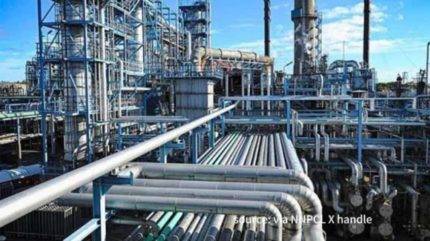On Thursday, the Federal Government made a significant announcement regarding the Port Harcourt Refinery, signaling a promising outlook for Nigeria’s fuel production. According to reports, the refinery is poised to commence operations aimed at generating two million liters of Premium Motor Spirit (PMS) and 2.2 million liters of diesel daily. This development comes as part of the government’s efforts to revitalize the country’s refining capacity and reduce reliance on imported petroleum products.
The government disclosed that the refinery, currently at an impressive 80% completion stage, is gearing up to become fully operational. The existing facility is set to have a production capacity of 54,000 barrels per day, with plans to commence production by the end of the year. Additionally, a new plant nearing completion is expected to further bolster production capabilities. This announcement marks a significant milestone in Nigeria’s quest for energy self-sufficiency and underscores the government’s commitment to enhancing the nation’s industrial infrastructure.
Speaking on behalf of the Federal Ministry of Labour and Employment, Olajide Oshundun, Director of Press and Public Relations, conveyed this information during a communication session on Thursday. Minister of State Nkeiruka Onyejeocha, accompanied by labor leaders, reiterated the government’s dedication to revitalizing the Port-Harcourt refinery during a recent visit to the facility. She emphasized that the combined output from both plants is projected to reach an impressive 10 million liters of PMS daily, a feat poised to significantly impact the country’s fuel supply landscape.
Minister’s Assurance on Port Harcourt Refinery Progress
Following an inspection visit to the Port-Harcourt refinery, Minister of State Nkeiruka Onyejeocha provided insights into the facility’s progress, offering assurances of its imminent operational status. Addressing concerns raised by organized labor and government stakeholders, the minister highlighted key developments observed during the visit.
Minister Onyejeocha affirmed that the Port-Harcourt refinery stands at an advanced stage of completion, with the old plant primed to initiate production at a capacity of 54,000 barrels per day. This initial output is projected to yield two million liters of PMS and 2.2 million liters of diesel daily, providing a vital boost to the nation’s fuel supply. Additionally, she underscored the impending commencement of operations at the new plant, which is undergoing its final phase of construction, slated for completion before the year’s end.
The minister’s statements underscored the collaborative efforts between government agencies and labor unions in ensuring the refinery’s revitalization and operational readiness. With a combined production capacity of 10 million liters of PMS daily once both plants are fully operational, the Port-Harcourt refinery is poised to play a pivotal role in meeting Nigeria’s domestic fuel demands and reducing dependency on imported petroleum products. This latest development reflects a positive stride towards achieving energy self-sufficiency and fostering economic growth within the nation’s industrial sector.
Port Harcourt Refinery Expansion Progress
With the Port Harcourt Refinery’s existing facility reaching 80% completion and the final stages of the new plant underway, Nigeria anticipates a substantial surge in its petroleum production capacity. This milestone marks a significant stride towards meeting the nation’s escalating demand for petroleum products. The progress is not only a testament to technological advancements but also a beacon of hope for Nigeria’s economic revitalization.
The impending completion of the refinery holds promising implications for various sectors of the economy. Firstly, it signifies a boost in domestic production, potentially alleviating the country’s reliance on costly petroleum imports. Additionally, the expanded capacity is poised to stimulate employment opportunities, both directly within the refinery and across associated industries. This influx of jobs is expected to inject vitality into local communities, fostering economic growth and stability.
Furthermore, the refinery’s enhanced production capabilities are forecasted to have a ripple effect on Nigeria’s foreign exchange reserves. By reducing the need for petroleum imports, the nation can conserve foreign currency and redirect it towards other critical sectors, bolstering overall economic resilience. Moreover, increased refining capacity could lead to a surplus of petroleum products for export, bolstering Nigeria’s position in the global market and further fortifying its foreign exchange earnings.
Revitalization of Port Harcourt Refinery:Economic Implications and Outlook
The resurgence of the Port Harcourt Refinery is poised to catalyze a wave of economic activity, with far-reaching implications for Nigeria’s fiscal landscape. Foremost, the anticipated reduction in petroleum prices, particularly of Premium Motor Spirit (PMS), holds the promise of relief for consumers burdened by escalating fuel costs. This, in turn, could alleviate inflationary pressures and enhance the purchasing power of the populace, fostering a more conducive environment for economic growth and development.
Moreover, the refinery’s revival is expected to inject vitality into the government’s revenue streams. As production ramps up and exports surge, Nigeria stands to reap substantial financial rewards, bolstering its coffers and enabling investment in critical infrastructure and social welfare programs. Additionally, the influx of foreign exchange resulting from increased exports could serve to stabilize the national currency, mitigating exchange rate volatility and bolstering investor confidence.
The imminent completion of the Port Harcourt Refinery represents a pivotal moment in Nigeria’s quest for economic resurgence. As the nation braces itself for the refinery’s operational debut by year-end, optimism abounds regarding the transformative impact it will have on the petroleum sector and the broader economy. However, stakeholders must remain vigilant in ensuring that the refinery’s operations adhere to the highest standards of efficiency, transparency, and environmental sustainability, thereby maximizing its long-term benefits for the Nigerian populace.
Table of Contents
Discover more from OGM News NG
Subscribe to get the latest posts sent to your email.














